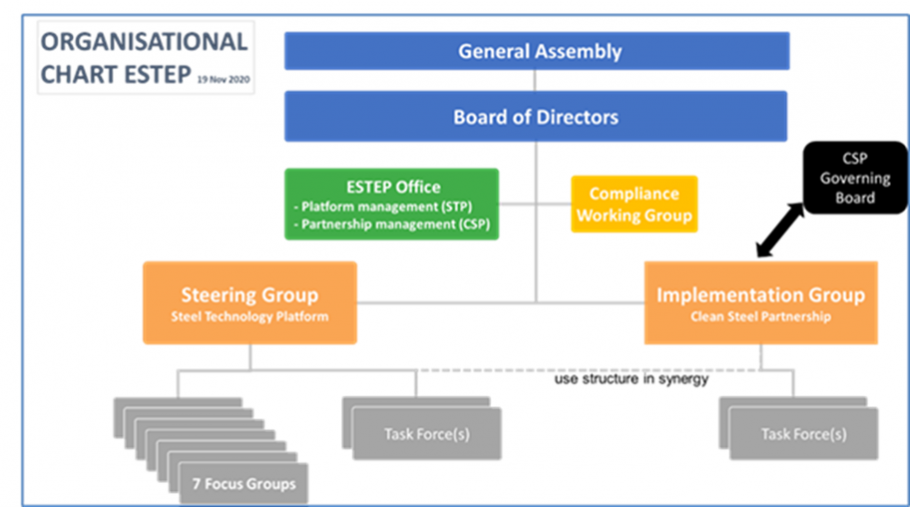
Formed in 2003, ESTEP was one of the first European Technology Platforms to be created. Its membership encompasses all the major European steel producers and the European Steel Association, EUROFER; academic centres and research organisations working in steel sector R&D; industrial stakeholders drawn from steel-consuming sectors, such as car manufacturing and heavy engineering; and other stakeholders such as trade union representatives. The European Commission and the Member States are also represented in ESTEP management committees.
Since March 2018 ESTEP is a non-profit organisation according to Belgian law (international ASBL). ESTEP membership is open for all steel stakeholders, which are eligible for European funding.
ESTEP is governed by the Board of Directors. The President is Annika Roos (Jernkontoret);
the Vice-Presidents are Axel Eggert, EUROFER, Paolo Galbiati (Tenaris), Marco Ometto (Danieli), Paul Tockert (SMS), and Wojtek Szulc (GIT).
The organisational structure of ESTEP is shown in the diagram.

The Steering Group is in charge of piloting the overall ESTEP research programme. It reviews the activities of the Focus Groups, ensures planning is in line with the SRA and coordinates between the Focus Groups. Any member of ESTEP is automatically member of the Steering Group.
The Implementation Group (IG) deals with all issues in regard to the Clean Steel Partnership (CSP). The IG prepares the private side's input to the Partnershipboard of the Clean Steel partnership. Any member of ESTEP is automatically member of the Implementation Group.
Seven Focus Groups deal with the implementation of ESTEP's Strategic Reaseach Agenda (SRA) in different domains: two of these deal with steel production. Low Carbon & Energy Efficency and Circular Economy. The first works on the development of safe, clean, energy-efficient and innovative technologies. Focus Group Circular Economy works on innovative solutions to increase the circularity of steel. These implies strong links with reducing CO2 emissions, conserving resources and boosting waste recovery. Three focus groups cover steel applications: steel solutions for transport and mobility, steel solutions for construction and infrastructure, and steel solutions for energy markets including engineering. The FG Construction is not active as long as the related activities are covered by the other FGs. The Focus Group People deals with activities for attracting people to the steel industry, skills development, education and training programmes, and occupational safety.
The ESTEP community is supported by the ESTEP Office and the Compliance Working Group. ESTEP facilitates every year a compliance refreshment training, which complements the in-house training of the members. The ESTEP compliance guidelines are part of the statues and Internal Rules. They can be downloaded in the document section below.
ESTEP established its Gender Equality Plan (GEP) in 2022